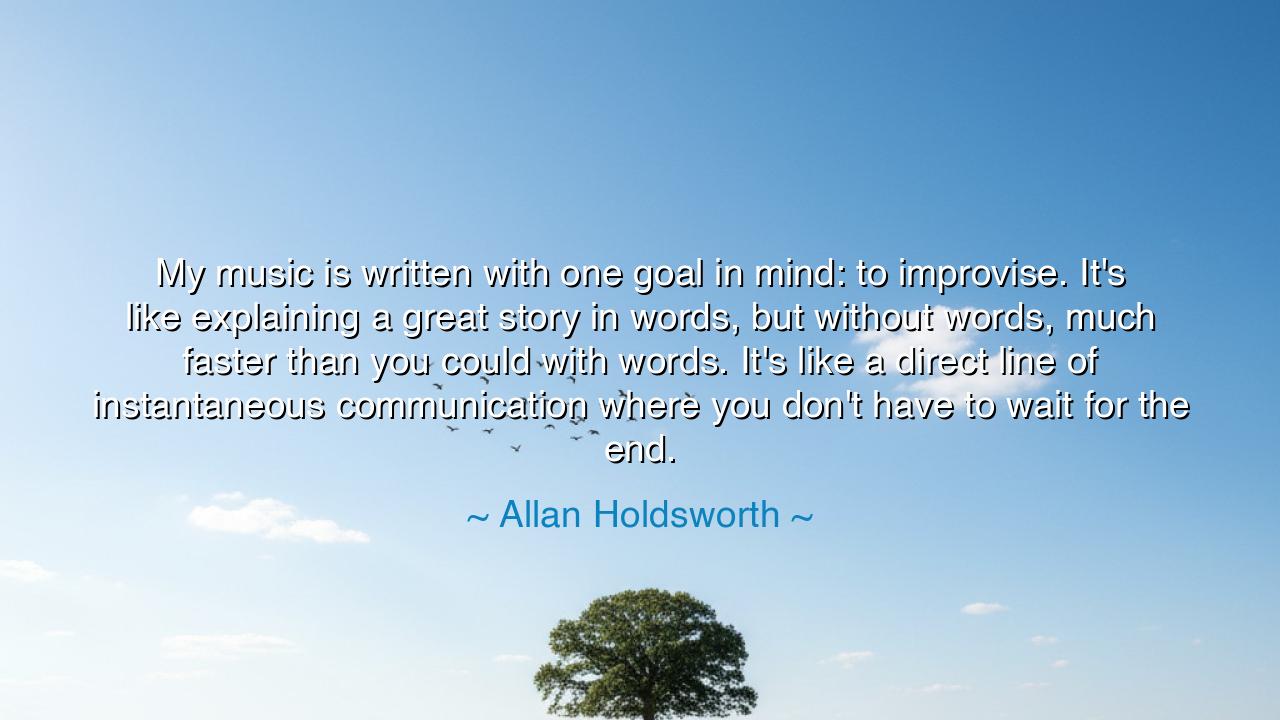
My music is written with one goal in mind: to improvise. It's
My music is written with one goal in mind: to improvise. It's like explaining a great story in words, but without words, much faster than you could with words. It's like a direct line of instantaneous communication where you don't have to wait for the end.






Host: The room feels calm, the soft light from the lamp casting a warm glow across the space. Outside, the world has fallen into stillness, the quiet of the evening wrapping around them. Jeeny sits on the couch, legs tucked beneath her, a cup of tea resting in her hands, her gaze distant but thoughtful. Jack, standing near the window, watches the darkened world outside, clearly reflecting on something. The calm atmosphere feels like the perfect backdrop for a deeper conversation.
Jeeny: “Jack, I came across a quote from Allan Holdsworth today that I thought was fascinating,” she says softly, drawing his attention. “He said, ‘My music is written with one goal in mind: to improvise. It’s like explaining a great story in words, but without words, much faster than you could with words. It’s like a direct line of instantaneous communication where you don’t have to wait for the end.’ What do you think about that?”
Jack: He turns, his brow furrowing slightly as he processes her words. “That’s a really cool way of describing music. It’s almost like improvisation is the language of the soul — a way of expressing something without the structure or limitations of words. He’s saying that music, when improvised, becomes a direct, instantaneous form of communication, almost like skipping all the filters that usually slow us down.”
Jeeny: “Exactly. Improvisation in music allows for immediate, unfiltered communication. It’s as if the musician is speaking directly to the listener, but instead of using words, they’re using sound. What’s fascinating is that it’s so much faster than verbal communication, because there’s no need for explanations or waiting for the right words. It’s pure, unmediated expression.”
Host: The light in the room deepens, as if the conversation is uncovering something more profound. Jeeny speaks with the understanding that improvisation isn’t just about playing an instrument, but about creating a moment of connection — a shared experience that doesn’t need to be explained, just felt. Jack stands still for a moment, reflecting on how music can transcend the limitations of language and create a deeper, more immediate link between the musician and the audience.
Jack: “I think that’s why music can sometimes say more than words. Words are often limited by meaning, by the need for interpretation, but music can communicate emotion or ideas instantly. When you improvise, it’s like you’re bypassing all the complexity of language and going straight to the heart of it. It’s raw, it’s direct, and it’s immediate.”
Jeeny: “Yes! And it’s also about vulnerability. When you’re improvising, you’re putting yourself out there, not knowing exactly where the music will take you. You’re trusting the moment, and the music flows as a direct reflection of your emotions, thoughts, and feelings right then and there. There’s something powerful in that kind of authentic expression.”
Host: The conversation seems to settle into something deeper now, the idea of improvisation revealing a new layer of understanding about how music connects people. It’s not just a performance; it’s a conversation, one that happens in real time, with no need for explanation. Jeeny and Jack reflect on how music, especially improvisational music, becomes an experience that transcends words, where feelings and ideas are communicated in a way that’s unfiltered, pure, and direct.
Jack: “It’s like the difference between telling a story and living it. When you improvise, you’re living the story, creating it in real time, without needing to pause and think about how to tell it. It’s almost like you’re feeling the story in every note.”
Jeeny: “Yes, exactly. It’s the moment that matters. The story isn’t something that gets told from beginning to end; it’s something that happens now. And the listener gets to experience that moment with the musician. It’s a shared connection, a communication that’s not bound by language, but by emotion and sound.”
Host: The room feels still now, as if the conversation has uncovered something profound about the power of improvisation in music. Jeeny and Jack sit in the quiet, each reflecting on how music can be a language in itself — one that bypasses the need for words and speaks directly to the heart. Allan Holdsworth’s quote serves as a reminder that music, especially improvised music, is a form of instantaneous communication — a way to connect with others in the purest, most unfiltered way possible.






AAdministratorAdministrator
Welcome, honored guests. Please leave a comment, we will respond soon